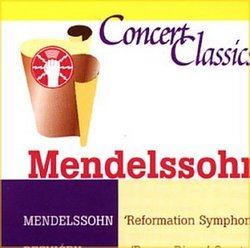| All Artists: Mendelssohn, Lpo, Sir Thomas Beecham Title: Symphony #5 Op 107 "Reformation" Members Wishing: 0 Total Copies: 0 Label: Dutton Labs UK Release Date: 2/8/2000 Album Type: Import Genre: Classical Styles: Opera & Classical Vocal, Historical Periods, Modern, 20th, & 21st Century, Symphonies Number of Discs: 1 SwapaCD Credits: 1 UPC: 765387550820 |
Search - Mendelssohn, Lpo, Sir Thomas Beecham :: Symphony #5 Op 107 "Reformation"
CD Details |
CD ReviewsWonderful performances, despite the limited WW II sound Santa Fe Listener | Santa Fe, NM USA | 03/15/2006 (4 out of 5 stars) "Recording materials were in short supply in 1945, and these late performances with the London Phil. (Beecham founded a new orchestra, the Royal Phil., in 1946) hark back to the 30s rather than ahead--by the next year he would he got much beter sonnics than we hear on this CD. But the reviewer below exaggerates their limitations. I have heard far worse, and here we have Beecham in prime territory. Berlioz, Sibelius, Rimsky-Korsakov, and Mendelssohn were among his best composers.
Among Beecham collectors, it's generally agreed that he reached his musical peak with the London Phil., so simply going for his later recordings, particuarly his Fifties remakes, isn't always the best answer. If you can tolerate the sonics, which have been well cleaned up by Dutton, these are wonderful performances. The May Night Over. is beautifully atmospheric, the excerpts from Les Toryens far more riveting than the later versions under Beecham, a fact that holds true for the oddments from Borodin, Sibelius, and Reznicek, also. Beecham collections tend to become disjointed thanks to his penchant for recording bits and pieces, so it's welcome to have a large complete work in the Mendelssohn 'Reformation' Sym. #5. There have been many respectful but half-hearted performances of this quintessentially Victorian work. Although recorded around the same time as the Berlioz excerpts, the sonics here sound more muddled to me, but they are certainly listenable, with a gratifying lack of shrillness in the upper registers. Beecham's reading doesn't really come alive until the fourth movement, but once it takes off it stays there. If you don't mind hearing this expansive work through a table radio, his is a very engaging reading. In sum, I would give five stars to everything here except the Mendelssohn, which rates three or four." |

